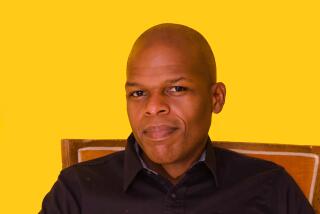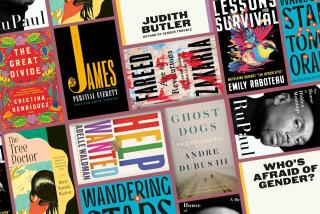A Revolutionary Woman by Sheila Fugard (Braziller: $14.95; 144 pp.)
- Share via
With apartheid and its grim consequences searing our daily news, this book could not be more timely. Set in 1920, it is the first novel by critically acclaimed South African poet/novelist Sheila Fugard to appear in this country.
Christina Ransome, an English-woman who lives and teaches in South Africa, is its narrator. A follower of Mohandas K. Gandhi during his years in South Africa, she has withdrawn to the semi-desert region of the Karoo.
Haunted by her political past and the pain caused by her lover’s betrayal in taking a child bride, she tutors a young man who, the child of an inter-racial marriage, is officially classified as Coloured. Intelligent, sensitive, Ebrahim is “. . . like a man before the fall of Adam. . . .”
Hated and ignored by a Boer community that disapproves of this complex relationship, Christina clings to her belief in Satyagraha , Gandhi’s nonviolent resistance, developed while he lived in South Africa. Just as he abhorred the caste system of India, she abhors the segregation laws. “The Boers are the Brahmins, and the Coloured are our Untouchables. . . .”
To try and escape the pain of discrimination, Ebrahim dreams of sailing to Europe where he can put his education to use. “I’m WHITE,” he tells Christina, insisting on his fantasy that he’s a shipwrecked white child brought up by the “brown people.” “You are a Coloured,” she reminds him, “and belong here. . . . I’ll coach you for that exam and you’ll better yourself.” But he flees from this reality “to the camouflage of the location, and will vanish there like an Untouchable. He digs himself in, and throbs and rages there.”
Caught in his turmoil, Christina assesses his future: “He will carve out poems from another universe.” As Gandhi adopted an Untouchable daughter, she’ll “. . . take Ebrahim’s hand for he is my Untouchable son . . . .”
Questioning Christina about her past, Ebrahim has learned of her lover’s betrayal, and the Indian custom of child brides. This knowledge leads Ebrahim, who “holds the mystery of the poet within” to commit an act that tragically alters his life. He is charged with a crime, but Christina does not desert him. The consequences of his crime on the community moves this powerful novel to its conclusion.
Through stylized prose, ritualistic dialogues, a chorus of raging characters, and Christina Ransome’s painful memories of her lover’s betrayal, woven into the book as if into a sensual Tantric tapestry, Fugard has dramatized the dangers of sexual injustice in 1920 and its resultant racial tensions.
Fugard studied drama at the University of Cape Town and has drawn on its various structural forms to present all the disparate political voices of South Africa. A poet’s sensibility touches each page of this short novel, etching in the grandeur, the stillness and the clarity of air that is truly African.
Like Doris Lessing, Fugard, who was born in England, went to live in Africa when she was a young girl. The clash of cultures, her inheritance, its problems and pain, resounds in this brave, compassionate book, as does her plea for nonviolent resistance and the hope that through it “liberation will come even to the Karoo.”
More to Read
Sign up for our Book Club newsletter
Get the latest news, events and more from the Los Angeles Times Book Club, and help us get L.A. reading and talking.
You may occasionally receive promotional content from the Los Angeles Times.







